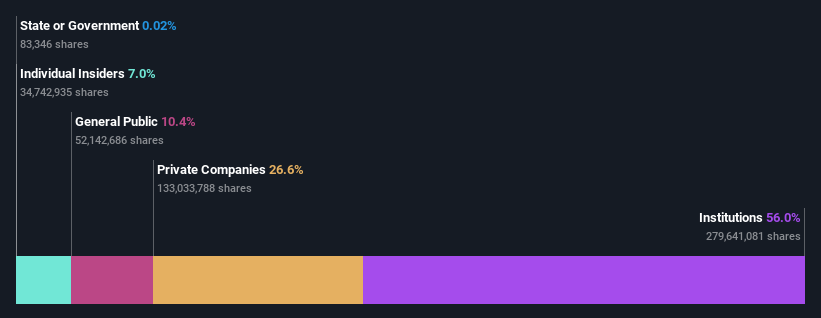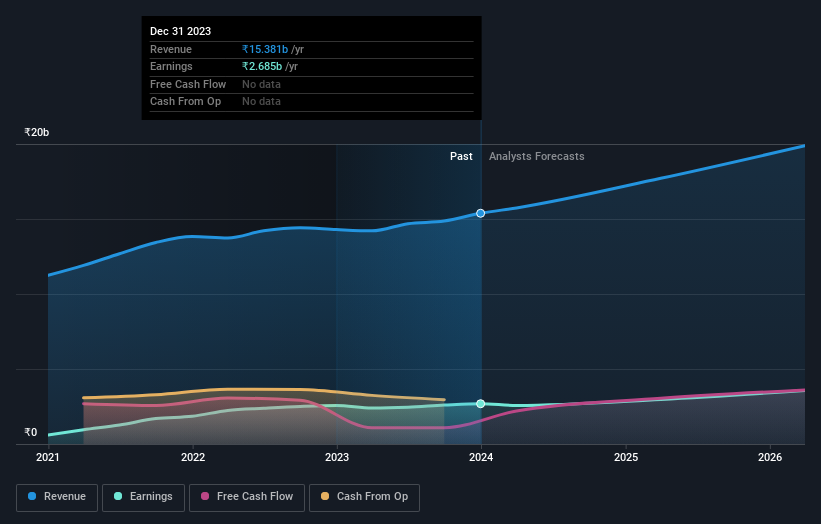Gateway Distriparks Limited's (NSE:GATEWAY) institutional investors lost 10% last week but have benefitted from longer-term gains
Key Insights
- Given the large stake in the stock by institutions, Gateway Distriparks' stock price might be vulnerable to their trading decisions
- The top 4 shareholders own 53% of the company
- Ownership research along with analyst forecasts data help provide a good understanding of opportunities in a stock
A look at the shareholders of Gateway Distriparks Limited (NSE:GATEWAY) can tell us which group is most powerful. The group holding the most number of shares in the company, around 56% to be precise, is institutions. Put another way, the group faces the maximum upside potential (or downside risk).
Institutional investors endured the highest losses after the company's market cap fell by ₹5.4b last week. However, the 54% one-year return to shareholders may have helped lessen their pain. We would assume however, that they would be on the lookout for weakness in the future.
In the chart below, we zoom in on the different ownership groups of Gateway Distriparks.
Check out our latest analysis for Gateway Distriparks

What Does The Institutional Ownership Tell Us About Gateway Distriparks?
Institutions typically measure themselves against a benchmark when reporting to their own investors, so they often become more enthusiastic about a stock once it's included in a major index. We would expect most companies to have some institutions on the register, especially if they are growing.
As you can see, institutional investors have a fair amount of stake in Gateway Distriparks. This implies the analysts working for those institutions have looked at the stock and they like it. But just like anyone else, they could be wrong. It is not uncommon to see a big share price drop if two large institutional investors try to sell out of a stock at the same time. So it is worth checking the past earnings trajectory of Gateway Distriparks, (below). Of course, keep in mind that there are other factors to consider, too.

Institutional investors own over 50% of the company, so together than can probably strongly influence board decisions. Hedge funds don't have many shares in Gateway Distriparks. Prism International Private Limited is currently the largest shareholder, with 27% of shares outstanding. For context, the second largest shareholder holds about 9.0% of the shares outstanding, followed by an ownership of 8.7% by the third-largest shareholder.
To make our study more interesting, we found that the top 4 shareholders control more than half of the company which implies that this group has considerable sway over the company's decision-making.
While it makes sense to study institutional ownership data for a company, it also makes sense to study analyst sentiments to know which way the wind is blowing. There are a reasonable number of analysts covering the stock, so it might be useful to find out their aggregate view on the future.
Insider Ownership Of Gateway Distriparks
The definition of company insiders can be subjective and does vary between jurisdictions. Our data reflects individual insiders, capturing board members at the very least. Management ultimately answers to the board. However, it is not uncommon for managers to be executive board members, especially if they are a founder or the CEO.
Insider ownership is positive when it signals leadership are thinking like the true owners of the company. However, high insider ownership can also give immense power to a small group within the company. This can be negative in some circumstances.
We can report that insiders do own shares in Gateway Distriparks Limited. It has a market capitalization of just ₹47b, and insiders have ₹3.3b worth of shares, in their own names. It is good to see some investment by insiders, but it might be worth checking if those insiders have been buying.
General Public Ownership
The general public-- including retail investors -- own 10% stake in the company, and hence can't easily be ignored. This size of ownership, while considerable, may not be enough to change company policy if the decision is not in sync with other large shareholders.
Private Company Ownership
We can see that Private Companies own 27%, of the shares on issue. It's hard to draw any conclusions from this fact alone, so its worth looking into who owns those private companies. Sometimes insiders or other related parties have an interest in shares in a public company through a separate private company.
Next Steps:
I find it very interesting to look at who exactly owns a company. But to truly gain insight, we need to consider other information, too. To that end, you should be aware of the 1 warning sign we've spotted with Gateway Distriparks .
If you are like me, you may want to think about whether this company will grow or shrink. Luckily, you can check this free report showing analyst forecasts for its future.
NB: Figures in this article are calculated using data from the last twelve months, which refer to the 12-month period ending on the last date of the month the financial statement is dated. This may not be consistent with full year annual report figures.
New: Manage All Your Stock Portfolios in One Place
We've created the ultimate portfolio companion for stock investors, and it's free.
• Connect an unlimited number of Portfolios and see your total in one currency
• Be alerted to new Warning Signs or Risks via email or mobile
• Track the Fair Value of your stocks
Have feedback on this article? Concerned about the content? Get in touch with us directly. Alternatively, email editorial-team (at) simplywallst.com.
This article by Simply Wall St is general in nature. We provide commentary based on historical data and analyst forecasts only using an unbiased methodology and our articles are not intended to be financial advice. It does not constitute a recommendation to buy or sell any stock, and does not take account of your objectives, or your financial situation. We aim to bring you long-term focused analysis driven by fundamental data. Note that our analysis may not factor in the latest price-sensitive company announcements or qualitative material. Simply Wall St has no position in any stocks mentioned.
About NSEI:GATEWAY
Gateway Distriparks
Provides integrated inter-modal logistics services in India.
Very undervalued with excellent balance sheet and pays a dividend.
Similar Companies
Market Insights
Community Narratives




